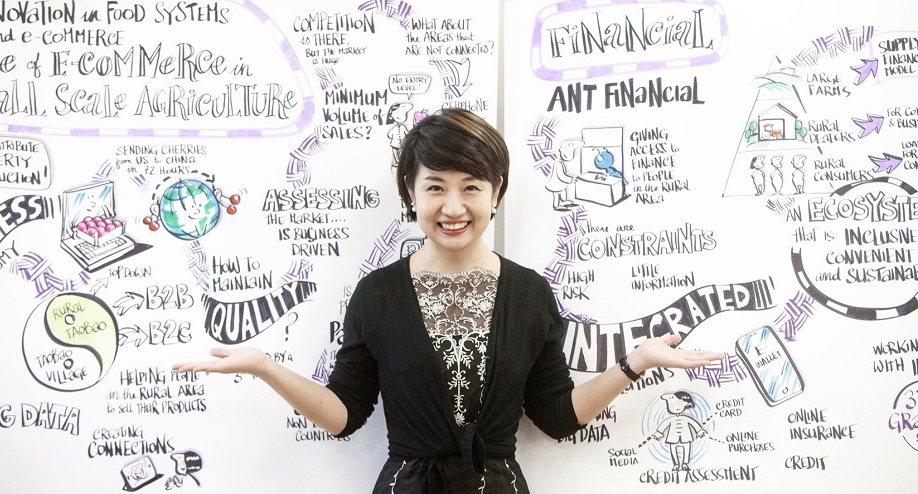Online buying and selling potential game changer for small-scale farmers

With a few clicks, farmers can access a broader range of consumer goods, agricultural inputs and financial products and services – not to mention marketing outlets.
“E-commerce can increase the farm gate price by 20 to 30 percent because there are fewer steps between producers and consumers,” said Carlo Bravi, an FAO senior economist. “And it can link farmers in poor, remote areas to an extremely dynamic market, which in this case is the Chinese urban market.”
This year’s FAO Investment Days, exploring innovations in agriculture, looked at how China is building e-commerce infrastructure and moving towards a cashless economy.
Rural outreach
 China is committed to wiping out poverty by 2020. And the country’s online giants, such as Alibaba, – one of the world’s biggest e-commerce platforms – could help achieve that goal.
China is committed to wiping out poverty by 2020. And the country’s online giants, such as Alibaba, – one of the world’s biggest e-commerce platforms – could help achieve that goal.
Just over 40 percent of China’s population – roughly 590 million people – lives in rural areas, and over a quarter uses the Internet.
When it comes to locally available consumer goods, rural dwellers typically have fewer choices and often pay more for products of lower quality.
At the same time, rural producers have limited access to information and lose a significant chunk of marketable produce due to poor logistics.
By bringing e-commerce into China’s rural communities, Alibaba’s Rural Taobao initiative hopes to remove those bottlenecks and improve two-way trade between rural and urban areas.
So far, they’ve set up 30,000 Rural Taobao partners in villages across the country, with plans to expand even further.
At Taobao rural service centres, the locally hired partners help consumers shop online for quality consumer goods and services at a lower price.
The platform also helps farmers sell their produce to other markets, including those in Shanghai and Beijing, and buy high quality agricultural materials such as greenhouses and machinery.
“Alibaba provides the big data – who’s buying what online, what’s high in demand, when the peak seasons are – so producers and entrepreneurs can tailor their production accordingly,” said Janice Chen, Head of Rural Finance Business in Ant Financial, an Alibaba affiliate.
Financial inclusion
Access to rural financing is a major constraint for many small-scale farmers and businesses throughout the world.
In China’s rural areas there is roughly one financial representative per 10,000 residents, as opposed to 329 per 10,000 residents in the cities.
Ant Financial, which originated from the online payment platform Alipay, is an innovative e-commerce-based lending programme.
Using big data, cloud computing and other technologies, Ant Financial seeks to provide “rural users with inclusive, convenient and sustainable financial services, and consumers with safe and reliable products,” Chen said.
Ant Financial works with the Alibaba Group to provide an integrated package to its rural clients –from loans to start or grow a business to different types of insurance to protect against risks.
“We want to build an ecosystem that links all of the players,” Chen added.
Ant Financial has developed a “3-1-0” online lending model. After the three-minute application process, the loan is granted in one second, all with zero manual intervention
The “3-1-0” system has since disbursed 395 billion RMB (roughly USD 60 billion) in loans, with an average ticket size of about USD 570.
Ant Financial has also developed an online and offline lending model for small businesses, as well as a supply chain finance model for larger farmers and cooperatives.
Going forward
 One challenge in linking poor, marginalized producers in China to high-end urban markets is raising quality and safety standards.
One challenge in linking poor, marginalized producers in China to high-end urban markets is raising quality and safety standards.
“The potential to increase the flow from rural to urban markets is very good but food safety is a major concern in China and the urban markets are very demanding,” Bravi said. “Consumers rightly want certified, traceable and safe food. They can buy imported products from Japan and South Korea, so there’s competition with the domestic market.”
This is an area where organizations such as FAO and the International Fund for Agricultural Development (IFAD) can provide guidance and technical assistance.
Alibaba’s desire to collaborate with both organizations is driven by its vision of a global e-commerce platform and commitment to corporate social responsibility – creating jobs and reducing poverty – in both China and abroad.
FAO is currently discussing a long-term partnership with Alibaba focused on poverty reduction, food safety and the use of big data.
IFAD, with FAO support, is also joining forces with the Chinese Government on a five-year project in Shaanxi province, one of China’s poorest provinces, and looking at how Alibaba can contribute.
“If we want to enter into value chain development with some specific enterprises in Shaanxi, Alibaba has the capacity to do the market intelligence, backed by this big data,” Bravi said.
As Alibaba plans to expand its e-commerce platform to other countries, particularly in Asia, Bravi added that it would be interesting to “draw lessons from our interventions in China to adapt and implement similar packages elsewhere.”
This article is part of a series to share the latest thinking and learning on innovations in agriculture from FAO Investment Days 2017.

